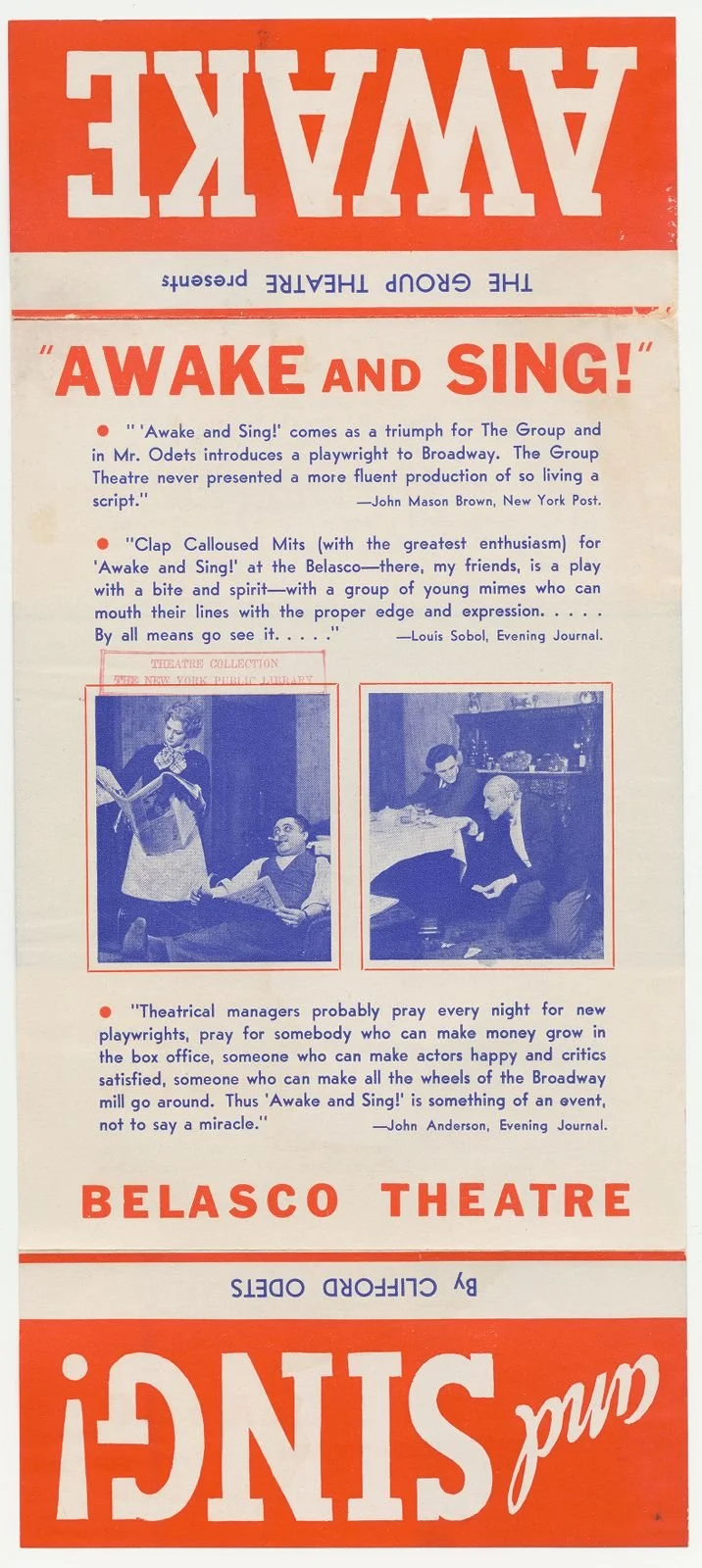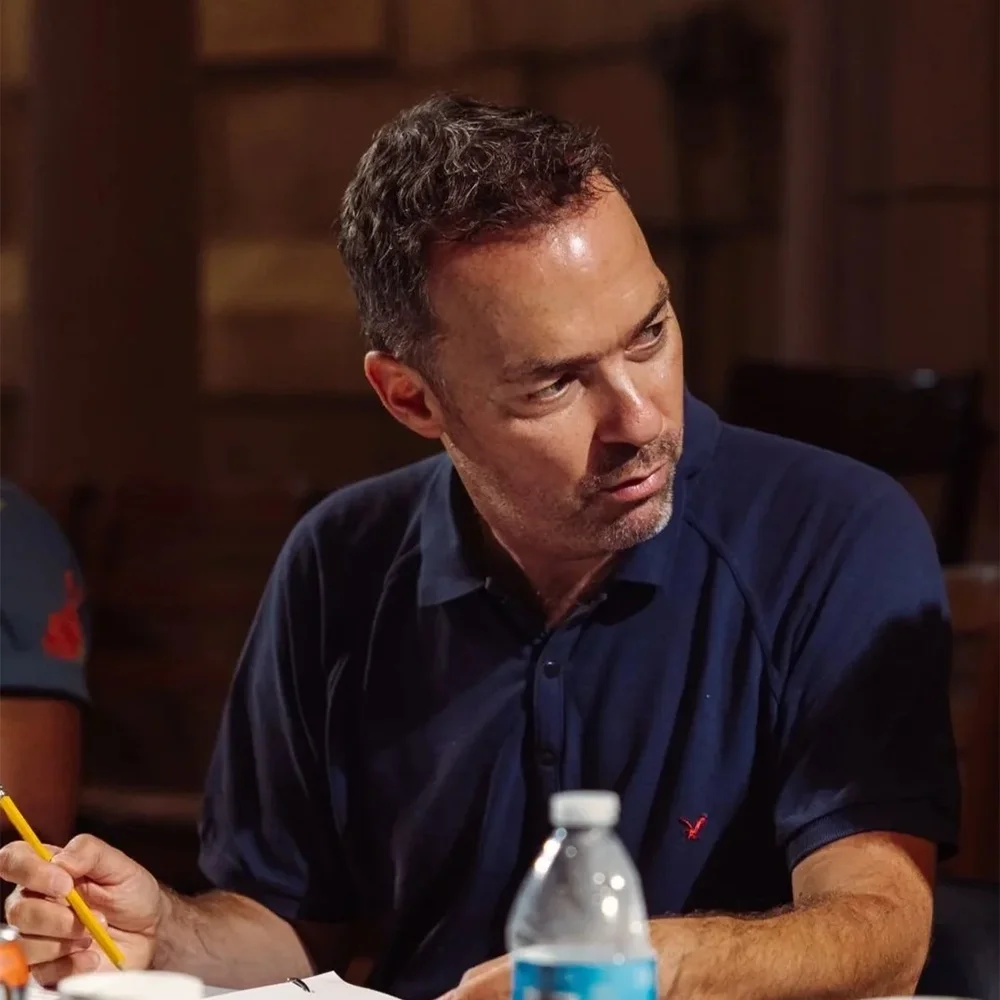ENDURING RELEVANCE:
A FRESH TAKE ON ODETS
Below, Director Erwin Maas shares his experience with bringing Clifford Odets' Awake and Sing! to a modern audience 90 years after the play took its first bow.
(Credit: Billy Rose Theatre Division, The New York Public Library. "Program for the stage production Awake and Sing!" The New York Public Library Digital Collections. 1935.)
Q: Why does Awake and Sing!—written 90 years ago—still speak urgently to audiences in 2025?
A: At the start of the play Clifford Odets writes: “All of the characters in Awake & Sing! share a fundamental activity: a struggle for life amidst petty conditions."
Unfortunately, as I think many will agree, we are not that too far from what people experienced in the 1930’s. A world in distress, the rise of fascism, economic hardship, an ever increasing wealth gap, and a younger generation that feels their future is collapsing. Many people today can identify with these characters who feel that they are stuck and struggle to escape the situation in which they find themselves. We can recognize the general feeling that exists: that things are going backwards, remembering better times that seem to be disappearing in our rearview mirrors, and having dreams that are being suffocated. Though the struggle to survive and a longing for a better future is present in every generation, it seems especially salient (again) in our current times.
Q: How are you drawing out themes of generational struggle and economic fragility in a way that resonates with today’s realities?
A: As written above, the themes of the play are very connected to the situation our world finds itself in today. But especially in this country with its current state, the weight, struggle and fear of what was experienced then is (again) very palpable. In an age where capitalism accelerates inequality and greed is openly rewarded, the wealthiest 1 percent continues to expand its influence and resources at the expense of the majority. And though polarization is at an all-time high - those who glorify the past and want things to go back to the way they were and those that dream of a different and more progressive future - they have one thing in common: they do not want things to be the way they are now. To me, the Berger family represents that 99 percent. They are the everyman, the people we see in our cities, the people that dream of different days to come.
Q: What gives you hope in this play, and how does this production embody that sense of hope against despair?
A: Despite the Bergers’ bickering, there’s a great sense of family in this play. And in a time where more and more folks bury themselves in their own separate screens and more people than ever feel lonely, it is nice to see that sense of connection within this family. By stripping away most of the set and props, our production especially focuses on the relationships between the characters. For better or worse, the characters of this play reject the status quo and, each in their own way, fight for a better future. To me it is hopeful to see that human trait. It might remind us as a call to action.
Also, the mere act of creating a live theater piece that night after night will be experienced by people who, each night, form their own unique community - breathing together, laughing together, experiencing something together - I find hopeful in its own way. I think it’s an antidote against the despair.
Q: What is the greatest challenge and greatest opportunity in regards to working on this play under these circumstances?
A: The greatest challenge by far is the space in which we will be performing, and its conditions/schedule needs. How to bring to life a hyper naturalistic play in a space that doesn’t allow for this kind of naturalism and the usual theater needs. The opportunity it provides is to look at this play through a different lens and create a contemporary retelling of the story highlighting the universality of the Berger family and what they are going through.
ERWIN MAAS (Director) is a New York based theatermaker, curator, educator and international arts advocate from the Netherlands with extensive international experience across a variety of creative and community contexts. In New York, his directions both Off Broadway and site specific have received multiple NY Times Critic’s Picks. His directing work ranges from plays by contemporary playwrights to devised, interdisciplinary immersive projects, opera, music theater and dance with performances for all ages. He is the Co-Executive Director of the Pan-African Creative Exchange (PACE) & teaches at CUNY Brooklyn College's MFA Performance & Interactive Media Arts Program (PIMA) - www.erwinmaas.com



